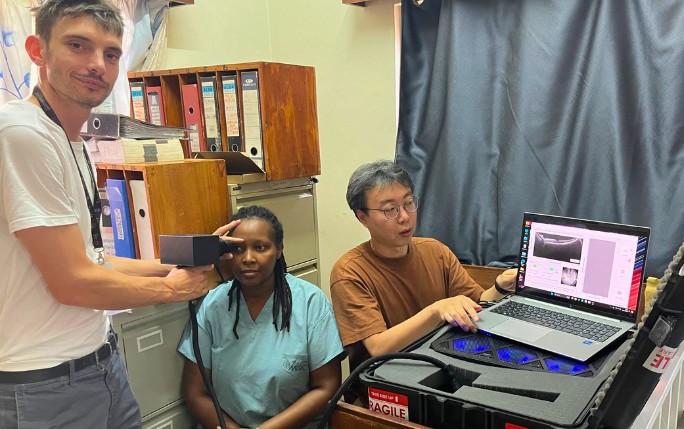University of Liverpool alumni and researchers raise awareness on World Malaria Day with pioneering research

As World Malaria Day approaches on 25th April, the University of Liverpool alumni and researchers join the global effort to raise awareness about this devastating disease and the urgent need for innovative solutions.
Malaria is known as a disease that claims the lives of over 400,000 people annually, with children in Africa bearing the heaviest burden. In response to this urgent need, the University’s researchers, including Dr Nicholas Beare and Professor Yalin Zheng from the Department of Eye and Vision Science along with Professor Yaochun Shen from the Department of Electrical Engineering and Electronics, have led a groundbreaking project funded by the Wellcome Trust to develop innovative methods for identifying children at risk of dying from cerebral malaria.
Central to this initiative is the development of a novel handheld optical coherence tomography (OCT) system, known as UoL HHOCT, which enables clinicians to detect crucial markers of cerebral malaria by imaging the retina. This technology, developed through collaborative efforts across multiple disciplines, holds the potential to revolutionise malaria diagnosis and treatment in resource-limited settings, where access to advanced medical equipment is often limited.
Our alumnus, Dr Nicholas Beare (MD 2006), who is a Consultant Ophthalmologist at the St. Paul’s Eye Unit and a Reader in Retina and Uveitis at the University, said:
“It’s great to be coordinating this multi-talented team looking to use eye scans to identify the sickest children with cerebral malaria, those at risk of lasting brain injury and death. We are aiming to demonstrate that the UoL HHOCT scanner can be used to assess children with cerebral malaria in many resource-poor settings across Malawi and sub-Saharan Africa. We could not do it without our Malawian colleagues and the University’s partner in Malawi, the Malawi-Liverpool-Wellcome Trust Clinical Research Unit.”
Another alumnus, Dr Zijian Zhang from the team (MSc Information and Intelligence Engineering 2011, PhD 2019), has been working on advancing OCT techniques for ophthalmic applications, leveraging his expertise to make this advanced OCT scanner accessible and manageable, particularly in regions where healthcare resources are scarce.
Currently, Dr Zhang is conducting the clinical study alongside his clinical colleague Dr Kyle Wilson at the Malawi-Liverpool-Wellcome Clinical Research Programme in Queen Elizabeth Central Hospital in Blantyre, Malawi. They are studying retina changes due to malaria using the UoL HHOCT.
Dr Zhang said: “By making advanced diagnostic tool (OCT) accessible and straightforward to manage, we aim to enhance malarial retinopathy detection and monitoring in resource-limited settings, ultimately improving cerebral malaria care and treatment for vulnerable children here in Malawi.”
On this World Malaria Day, we stand proud of the efforts of our alumni and researchers to raise awareness about the impact of malaria and emphasise the critical need for continued research and investment in innovative solutions.